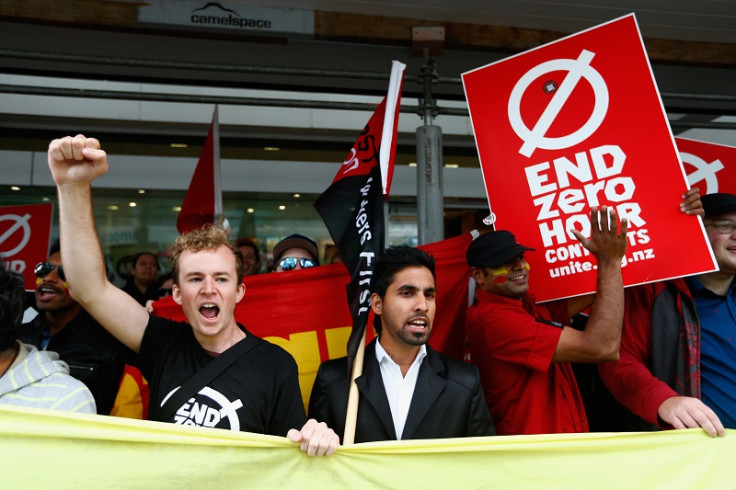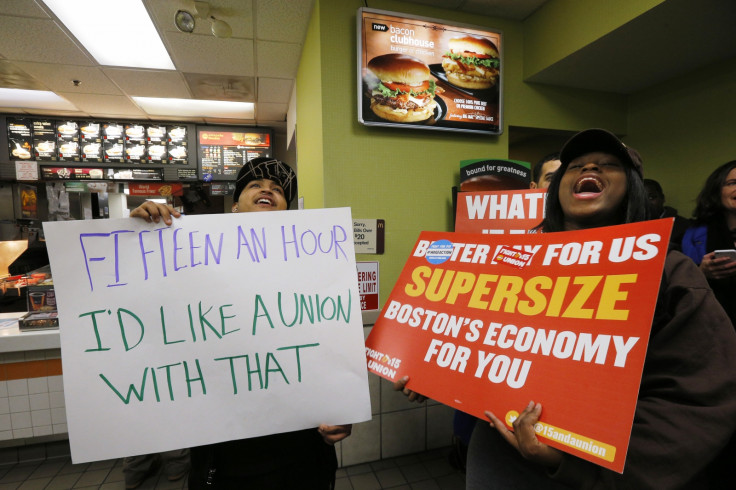Fast Food Day of Action: Why McDonald's, KFC and Burger King workers aren't serving you today

Tens of thousands of protesters in cities and towns around the world are presently campaigning for a living wage and secure employment. The #FightFor15 campaign, initiated by fast food workers in the United States, demands $15 an hour and an end to zero hours contracts.
They chose April 15 because the date, 4/15, sounds like "for 15." The campaign has spilled over into other areas of the economy where workers are hired and fired on the lowest possible standards because this is a crisis not in one sector but a general workplace epidemic. So retail workers are standing with fast food cashiers, home care providers, airport workers, and other precarious workers to demand a pay rise and security in employment.
In February over half a million Walmart workers in the United States won a pay rise which has had positive knock-on effects for workers in fast food chains such as Target, Marshalls, McDonalds, TJ Maxx and Dominos, announcing wage raises in the following month.
It is already becoming a major issue in the pre-US Presidential primary campaigning with significant voices pushing for Hillary Clinton to commit to a figure which meets campaigners' aspirations in order to effectively tackle pay inequality. This is a campaign issue which she has already highlighted when stating: "the deck is still stacked in favour of those at the top."
The pressure is mounting to act and steal a march in the forthcoming election following Mayor Rahm Emanuel of Chicago, a former Clinton White House aide, recently backing a measure to raise the minimum wage in the city to $13 from $8.25 by 2019. While this patently does not go far enough, the political narrative has changed from contesting the need for a living wage to the level at which it should be set - a massive victory for the campaign in itself.
Why is this important to those not directly affected? Well, raising the wage makes economic sense by boosting the purchasing power of millions of workers, in conjunction with the fact that more than 52% of fast-food employees depend on public assistance to make ends meet in the United States. In essence the state is subsidising low-pay employers to the detriment of us all, while these companies cream-off the profits.
But this is not just a North American issue – far from it.
The issue of pay rewards is prevalent in all advanced industrial economies, as general living standards have stalled if not contracted since the global recession. Companies and politicians are increasingly being challenged on how to pay and treat their workers.

Recently Brazil's two biggest trade union federations launched legal action against McDonald's' largest franchisee, accusing it of time-clock fraud, unhealthy working conditions and failure to pay unemployment insurance. Those charges could lead to fines of up to 30% of annual sales.
In the UK protesters will also be on the streets to support the campaign, which is being fuelled by the same falling living standards and insecure work. Real pay, according to the Annual Survey of Hours and Earnings in November 2014, highlighted average weekly earnings are down 8.8% between 2008 and 2014 after adjusting for consumer price inflation. These figures directly correlate with around 1.4 million people estimated to have 'contracts' that did not guarantee a minimum number of hours according to the official ONS estimates.
So we are dealing with a global problem facilitated by neo-liberal dynamics. It is manifest in different forms, but let's be clear, the same functionality is in place. It is now time for politicians to follow the lead of campaigners and commit to a fair living wage and more secure work by banning zero-hours contracts not only in the interests of these workers but us all – if not then they should pay the price come election time.
Andrew Brady works for Unite the Union. You can follow the group on Twitter @unitetheunion.
© Copyright IBTimes 2025. All rights reserved.





















